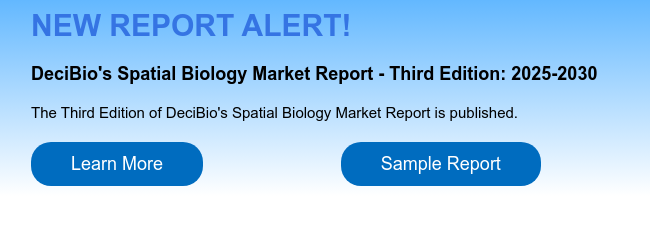Highlights & Summary
June saw exciting developments in AI use across drug discovery, diagnostics, and healthcare.
Biopharma companies such as AstraZeneca, Lisata, and Juvenescence are increasingly partnering with or acquiring AI platforms to accelerate drug discovery through multiomics, virtual cell modeling, and knowledge graph-based target prediction, signaling a shift toward data-driven R&D.
Diagnostic innovation is being driven by AI tools that enable early disease detection, real-time PCR interpretation, and digital pathology workflows, with organizations like PathAI, Alexion, and Cardio Diagnostics integrating AI to enhance diagnostic speed, transparency, and precision.
AI adoption in healthcare is expanding through partnerships, infrastructure investments, and new clinical tools like conversational EHRs and predictive care platforms, with institutions such as UMass Chan, Stanford Medicine, and Emory Healthcare leading implementation to improve care delivery and operational efficiency.
Happy reading!
AI in Drug Discovery
1 | AstraZeneca enters strategic collaboration with CSPC Pharmaceuticals focused on AI-enabled research | Partnership
2 | Lisata Therapeutics and GATC Health Expand Relationship to Advance AI-Driven Drug Discovery and Development | Partnership
3 | Xaira Therapeutics Releases Largest Perturb-Seq Dataset to Power the Virtual Cell | New Research
4 | BioAro Launches PanOmiQ™ Research in Breakthrough for AI-Driven Drug Discovery and Multi-Omics | New Product
5 | Fauna Bio Launches Fauna Brain™ AI Platform to Accelerate Drug Discovery Inspired by Nature’s Most Resilient Species | New Product
6 | NVIDIA Partners With Novo Nordisk and DCAI to Advance Drug Discovery | Partnership
7 | Juvenescence acquires AI drug discovery company Ro5 to boost R&D capabilities and drive pipeline of medicines to extend healthy lifespan | M&A, Financing
AI in Diagnostics
1 | PathAI and Northwestern Medicine Announce Strategic Collaboration to Deploy the AISight Digital Pathology Platform and Co-Develop New AI Diagnostics | Partnership
2 | Pangaea Data, AstraZeneca's Alexion partner to spot rare disease with EHRs | Partnership
3 | Cardio Diagnostics Secures Japanese Patent for AI-Driven Cardiovascular Disease Detection Technology | Pipeline
4 | Diagnostics.ai launches fully-transparent machine learning platform for real-time PCR diagnostics | New Product, Regulatory
5 | AI 'co-pilot' used to speed up cancer diagnosis | Clinical
AI in Healthcare
1 | UMass Chan teams up with Red Cell Partners to test AI health care products | Partnership
2 | 5 under-resourced health centers tackle AI's challenges together | Partnership
3 | Stanford Medicine's ChatEHR expedites the chart review process | New Product
4 | Guidehealth secures $10M from Emory Healthcare | Financing
5 | Autonomize AI Raises $28 Million Series A to Power Next-Generation Agentic AI for Healthcare and Life Sciences | Financing
AI in Drug Discovery
1 | AstraZeneca enters strategic collaboration with CSPC Pharmaceuticals focused on AI-enabled research | Partnership
AstraZeneca has entered a strategic research collaboration with China-based CSPC Pharmaceuticals. The collaboration aims to advance the discovery and development of novel oral candidates across chronic indications. Under the agreement, CSPC will receive an upfront payment of $110 million, and is also eligible to receive up to $1.62 billion in potential development milestone payments and up to $3.6 billion in sales milestone payments; AstraZeneca will retain the rights to exercise options for exclusive licenses to develop and commercialise worldwide candidates identified under this agreement.
2 | Lisata Therapeutics and GATC Health Expand Relationship to Advance AI-Driven Drug Discovery and Development | Partnership
Lisata Therapeutics, a clinical-stage pharmaceutical company developing therapies for the treatment of advanced solid tumors and other serious diseases, and AI-first biotech GATC Health Corp., have announced an expanded partnership, whereby Lisata will leverage GATC’s proprietary Multiomics Advanced Technology platform to identify new AI-predicted combination therapies and help advance GATC’s AI-discovered therapeutic for opioid use disorder into human clinical trials early in 2026.
3 | Xaira Therapeutics Releases Largest Perturb-Seq Dataset to Power the Virtual Cell | New Research
The AI drug developer Xaira Therapeutics has released the largest publicly available Perturb-seq atlas, termed X-Atlas/Orion, for AI model training and detection of dose-dependent genetic effects to enhance predictive power for drug discovery. Touted as the largest public resource for drug discovery, this dataset marks a departure from traditional drug discovery methods by leveraging Perturb-seq rather than observational data to offer more advanced gene expression insights. Xaira aims to use this database to further develop their virtual cell model. The company has stated that they are open to discussing data collaborations with commercial entities that express interest.
4 | BioAro Launches PanOmiQ™ Research in Breakthrough for AI-Driven Drug Discovery and Multi-Omics | New Product
BioAro has unveiled its expanded PanOmiQ platform at the 2025 BIO International Convention in Boston. The updated platform includes PanOmiQ Research (an AI-integrated multi-omics and drug discovery solution), multilingual clinical reporting, and a beta-stage AI-powered deep drug discovery module; all together, the updates aim to create an “omics-to-therapeutics” ecosystem (the first of its kind).
5 | Fauna Bio Launches Fauna Brain™ AI Platform to Accelerate Drug Discovery Inspired by Nature’s Most Resilient Species | New Product
Fauna Bio has launched Fauna Brain, their proprietary AI platform designed to accelerate target discovery and streamline early-stage R&D by autonomously executing complex research tasks traditionally requiring expert teams. Early results show Fauna Brain can score a single target in as little as 2.5 minutes at an average cost of ~$0.01.
6 | NVIDIA Partners With Novo Nordisk and DCAI to Advance Drug Discovery | Partnership
NVIDIA and Novo Nordisk are teaming up to accelerate drug discovery efforts through innovative AI use cases. The work supports Novo Nordisk’s agreement with the Danish Centre for AI Innovation to use the Gefion sovereign AI supercomputer (powered by NVIDIA DGX SuperPOD).
7 | Juvenescence acquires AI drug discovery company Ro5 to boost R&D capabilities and drive pipeline of medicines to extend healthy lifespan | M&A, Financing
Juvenescence, a clinical-stage drug development company, has completed its acquisition of AI drug discovery company Ro5, whose proprietary Biomedical Knowledge Graph platform aims to optimize drug discovery based on biological, therapeutic, and market potential. The acquisition follows a $76M Series B-1 financing first-close led by M42 in May 2025.
AI in Diagnostics
1 | PathAI and Northwestern Medicine Announce Strategic Collaboration to Deploy the AISight Digital Pathology Platform and Co-Develop New AI Diagnostics | Partnership
Under this multi-year collaboration, Northwestern Medicine will adopt PathAI’s AISight digital pathology image management system, which enables the analysis of high-resolution pathology images using PathAI’s machine learning algorithms. The partnership will also enable a framework for joint research initiatives and co-development opportunities.
2 | Pangaea Data, AstraZeneca's Alexion partner to spot rare disease with EHRs | Partnership
AstraZeneca’s Alexion division has partnered with Pangaea Data to develop and clinically validate an AI tool for the early identification of hypophosphatasia, a rare metabolic disease. This collaboration aims to streamline diagnosis by leveraging EHR data and AI algorithms to detect patterns indicative of the disorder.
3 | Cardio Diagnostics Secures Japanese Patent for AI-Driven Cardiovascular Disease Detection Technology | Pipeline
Cardio Diagnostics (Inc.), an AI-powered precision cardiovascular medicine company, has announced that the Japan Patent Office has issued a new patent for their growing biomarker portfolio, further supporting the company’s global IP strategy. Their AI-driven Integrated Genetic-Epigenetic Engine aims to improve the prevention, detection, and treatment of cardiovascular disease.
4 | Diagnostics.ai launches fully-transparent machine learning platform for real-time PCR diagnostics | New Product, Regulatory
In response to CE-IVDR regulations coming into effect, Diagnostics.ai has launched the industry's first fully-transparent machine learning platform for clinical real-time PCR diagnostics to meet heightened standards for diagnostic accuracy, reproducibility, and algorithm transparency. The platform shows how and why a result was achieved and allows labs to track model performance and detect drift in real time, to better enable labs to understand the suggestions that the AI makes.
5 | AI 'co-pilot' used to speed up cancer diagnosis | Clinical
AI software has been introduced by a West Yorkshire NHS Trust in a bid to speed up diagnosis of conditions such as lung cancer and infections. The project is part of the Yorkshire Imaging Collaborative, a region-wide imaging network, and is backed by the NHS AI Diagnostic Fund which has provided £21m to 11 imaging networks across the country.
AI in Healthcare
1 | UMass Chan teams up with Red Cell Partners to test AI health care products | Partnership
The Health AI Assurance Laboratory at UMass Chan Medical School has formed a two-year collaboration with Red Cell Partners, an incubator and investment firm, to forward AI in healthcare. The agreement makes UMass Chan an established member of Red Cell’s Partners Advancing Critical Technologies program and allows UMass Chan to select AI health care products from Red Cell’s portfolio.
2 | 5 under-resourced health centers tackle AI's challenges together | Partnership
Supported by an initiative of the Duke Institute for Health Innovation and Duke University School of Medicine, five under-resourced health centers have joined forces to form the Health AI Partnership, with the goal of collaboratively addressing the challenges and opportunities of implementing AI in clinical settings. By sharing experiences, resources, and best practices, they're working to navigate barriers such as limited infrastructure, insufficient expertise, and regulatory hurdles. Early examples of AI implementation include ambient scribes, a "no-show" algorithm, sepsis warning code and retinal diabetic retinopathy scanning.
3 | Stanford Medicine's ChatEHR expedites the chart review process | New Product
Stanford Medicine has launched ChatEHR, an AI-powered tool that allows clinicians to query patient health records conversationally, summarize charts, and automate tasks within the electronic health record system. Currently in pilot use, ChatEHR aims to reduce manual chart review time, particularly in high-pressure situations like emergency admissions or patient transfers, and provide clinical decision-making support (in development).
4 | Guidehealth secures $10M from Emory Healthcare | Financing
Emory Healthcare has made a $10 million strategic investment in GuideHealth, aiming to accelerate the rollout of GuideHealth’s AI-powered care coordination platform to enhance proactive management of chronic conditions. The platform employs predictive analytics to identify patients at risk of preventable health events, enabling targeted interventions to close care gaps.
5 | Autonomize AI Raises $28 Million Series A to Power Next-Generation Agentic AI for Healthcare and Life Sciences | Financing
Autonomize AI, an Austin-based healthcare platform, secured $28 million in Series A funding led by Valtruis, The Cigna Group Ventures, and Tau Ventures, boosting its total financing to $32 million. The startup will deploy the capital to scale its Agentic AI Orchestration platform—already used by Fortune 100 health systems and life sciences firms—to automate workflows such as care management, chart reviews, and prior authorizations, with early results showing up to 50% faster decision-making for patient claims and authorizations.

.png)









.png)


